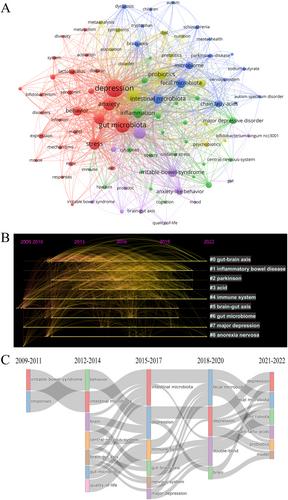Microbiome-gut-brain axis as a novel hotspot in depression
Abstract
As a prevalent psychiatric disorder, the etiology of depression remains largely elusive, necessitating further investigation into its pathophysiological underpinnings. Notably, the comorbidity of depression with other mental health conditions and chronic diseases often presents alongside gastrointestinal symptoms. Research on the microbiome-gut-brain axis (MGBA) has emerged as a promising avenue for elucidating the pathophysiology of depression. In this study, bibliometric analysis tools, including HistCite, VOSviewer, CiteSpace, and the bibliometrix R package, were employed to comprehensively explore the MGBA-depression connection. A comprehensive survey identified 980 relevant publications concerning the MGBA-depression relationship, with a significant increase in research output observed since 2014. This analysis pinpointed five key factors within the MGBA-depression domain: cytokines, maternal separation, neuroinflammation, probiotics, and the vagus nerve. The insights presented herein offer valuable perspectives on prevailing research models that investigate the intricate interplay among the microbiome, gastrointestinal system, and brain within the context of depression. Based on these findings, future investigations should prioritize developing microbial-based interventions and innovative therapeutic modalities aimed at alleviating depression. By leveraging interdisciplinary collaboration and enhancing our understanding of MGBA–depression connections, we can pave pathways toward more effective treatments. Furthermore, improving outcomes for individuals with depression may be achieved by deepening our comprehension of the complex relationships between depression itself, the gut-brain axis, and gastrointestinal microbiota.


 求助内容:
求助内容: 应助结果提醒方式:
应助结果提醒方式:


